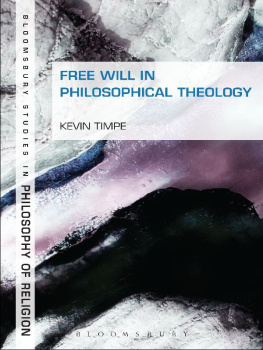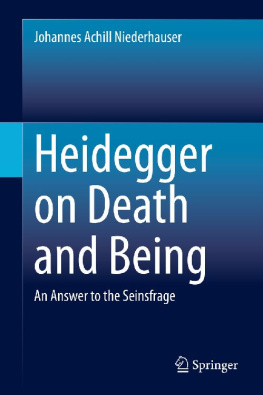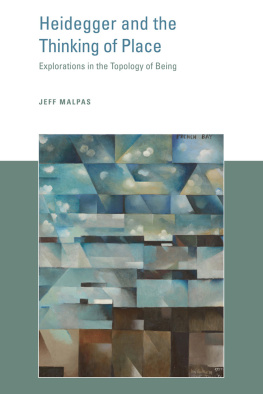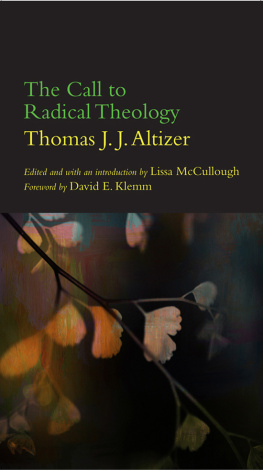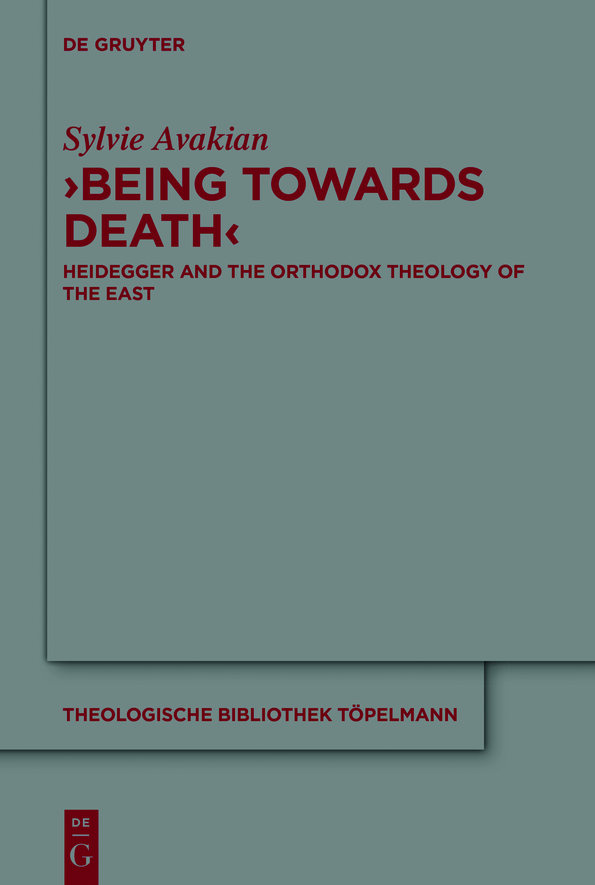Theologische Bibliothek Tpelmann
Edited by
Bruce McCormack
Friederike Nssel
Christoph Schwbel
Volume
ISBN 9783110705331
e-ISBN (PDF) 9783110707519
e-ISBN (EPUB) 9783110707663
Bibliographic information published by the Deutsche Nationalbibliothek
The Deutsche Nationalbibliothek lists this publication in the Deutsche Nationalbibliografie; detailed bibliographic data are available on the Internet at http://dnb.dnb.de.
2021 Walter de Gruyter GmbH, Berlin/Boston
For Christine and Grace
A Word of Thanks
I wish to express my deepest thanks and appreciation to Prof. Dr. Christoph Schwbel, not only for his wise guidance and insightful remarks concerning this particular work, which was presented to the Protestant faculty of the University of Tbingen as a Habilitationsschrift in January 2018, but also for all his profound responsiveness and encouraging accompaniment throughout the entire process of my post-doctoral degree (Habilitation) in Tbingen.
As Nature gives the other creatures over
to the venture of their dim delight
and in soil and branchwork grants none special cover,
so too our beings pristine ground settles out plight;
we are no dearer to it; it ventures us. Except that we,
more eager than plant or beast,
go with this venture, will it, adventurous more
sometimes than Life itself, more daring by a breath
(and not in the least from selfishness)
There, outside all caring,
this creates for us safetyjust there,
where the pure forces gravity rules; in the end,
it is our unshieldedness on which we depend,
and that, when we saw it threaten, we turned it
so into the Open that, in widest orbit somewhere,
where the Law touches us, we may affirm it.
Wie die Natur die Wesen berlt
dem Wagnis ihrer dumpfen Lust und keins
besonders schtzt in Scholle und Gest,
so sind auch wir dem Urgrund unseres Seins
nicht weiter lieb; es wagt uns. Nur da wir,
mehr noch als Pflanze oder Tier
mit diesem Wagnis gehen, es wollen, manchmal auch
wagender sind (und nicht aus Eigennutz),
als selbst das Leben ist , um einen Hauch
wagender Dies schafft uns, auerhalb von Schutz,
ein Sichersein, dort, wo die Schwerkraft wirkt
der reinen Krfte; was uns schlielich birgt,
ist unser Schutzlossein und da wirs so
ins Offne wandten, da wirs drohen sahen,
um es, im weitsten Umkreis irgendwo,
wo das Gesetz uns anrhrt, zu bejahen.
Rainer Maria Rilke: Improvisierte Verse
List of Abbreviations
Abbreviations of the most commonly cited writings in this book appear here with the dates of their writing. Full citations of the works are given in a footnote at the first mention of a reference. The references are also provided in the alphabetical bibliography at the end of the work. Here I am maintaining the abbreviations most used in English works on Heidegger, while for citing the Gesamtausgabe I use the conventional GA abbreviation.
Whenever articles by Heidegger or Berdyaev are translated by authors other than the general editor of a book they appear as separate references. Hence, whenever articles are translated by the same translator or editor of a work, they do not appear separately.
Pseudo-Dionysius the Areopagite
DNMT
The Divine Names and Mystical Theology
Martin Heidegger
BC
Basic Concepts (1941)
BCAP
Basic Concepts of Aristotelian Philosophy (1924)
BPP
The Basic Problems of Phenomenology
BQP
Basic Questions of Philosophy: Selected Problems of Logic (193738)
BT
Being and Time [Macquarries translation] (1927)
BWP
The Beginning of Western Philosophy: Interpretation of Anaximander and Parmenides (1932)
CP
Contributions to Philosophy (From Enowning) (19361938)
DT
Discourse on Thinking (194455)
EB
Existence and Being (19291944)
EHP
Elucidations of Hlderlins Poetry (193669)
EP
The End of Philosophy (193646)
EV
The Event (194142)
FCM
The Fundamental Concepts of Metaphysics: World, Finitude, Solitude (192930)
HHI
Hlderlins Hymn The Ister (1942)
ID
Identity and Difference (19561957)
IM
Introduction to Metaphysics (1935)
IPTP
Introduction to PhilosophyThinking and Poetizing (1928)
LH
Letter on Humanism (1946) in Pathmarks
M
Mindfulness (19389)
MHC
Martin Heidegger in Conversation (1969)
OEG
On the Essence of Ground (1929)
OG
Only a God can Save Us: Der Spiegels Interview with Martin Heidegger (1966)
OHF
Ontology: The Hermeneutics of Facticity (1923)
P
Postscript (1943) in Existence and Being and in Pathmarks
PATH
Pathmarks (191961)
PMH
Preface by Martin Heidegger, in William J. Richardson, Heidegger: Through Phenomenology to Thought (1962)
PLT
Poetry, Language, Thought (193654)
PR
The Principle of Reason (195556)
QCT
The Question Concerning Technology and Other Essays (193654)
RA
Rectors AddressThe Self-Assertion of the German University and The Rectorate 1933/34: Facts and Thoughts in Review of Metaphysics
SR
Science and Reflection (1953)
T
The Turning (1949)
TB
On Time and Being (19624)
WCT
What is Called Thinking? (19512)
WM
What is Metaphysics (1929) in Existence and Being
WP
What is Philosophy? (1955)
Nikola Berdyaev
BE
The Beginning and the End (1947)
D
Dostoevsky (1923)
DM
The Destiny of Man (1931)
DR
Dream and Reality: An Essay in Autobiography (1949)
FS
Freedom and the Spirit (1927)
MCA
The Meaning of the Creative Act (1916)
MH
The Meaning of History (1923)
SF
Slavery and Freedom (1939)
SR
Spirit and Reality (1937)
TR
Truth and Revelation (1947)
Introduction
Traveling in the direction that is a way toward that which |
is worthy of questioning is not adventure but homecoming. |
Martin Heidegger
The present work appeals to the works and thoughts of Martin Heidegger and Nikola Berdyaev as powerful sources for theological and philosophical inspiration in our times. Here, I propose that Heideggers and Berdyaevs contributions prove a major and a significant milestone in the history of human thought and Christian theology of which we, in our contemporary era, are desperately in need. The philosophical-theological endeavor of Heidegger and Berdyaev extend beyond the particular fields of philosophy and theology with their metaphysical, epistemological, ethical, doctrinal and hermeneutical branches. The creative profundity of the thoughts of both thinkers rekindles the primordial and the simple truth about the human being in relation to truth as such, or the divine Mystery, as Orthodoxy would prefer to call it. Their genre of writing challenges the abstract-speculative constructions of most philosophical and theological enterprises and aspires to attain meaning and inner (spiritual) freedom that transcend the disharmonies and the trepidations of our times. In the light of their thoughts, philosophy and theology acquire ecumenical and dialogical vantages that reach beyond objectifications and categorizations, the need for which in the 21st century in both Eastern and Western societies is unquestionable. Both authors longed for that which is beyond the constrictions of particular finite claims of truth. Both dwelt on the primacy of ineffable, pre-conceptual experiences of the divine or the primordial Word, through which the divine could come to more unrestricted self-revelation. Both, however, admitted that being remains Mystery as its self-manifestation in beings is at once its self-concealment. Today we know that it is only in the possibility of retrieving such experiencesfrom the past, moving to the future and yet allowing the word to pervade the presentthat the seeds of ecumenism and dialogue lie. We are also aware of the risks that such a path entails, knowing that the only guarantee for its truthfulness is its own fidelity and steadfastness that is its enduring the risks and the perils of being towards death. Today we can read Heidegger and Berdyaev, retrieve their thoughts and say that which has been left unsaid. The present work is, then, an attempt on this path. It inevitably, as a finite endeavor, will also leave things unsaid. Nevertheless, the path goes on and the possibility of saying again and again will always be there, in order that a glance of the fullness of the eternal word can be penetrated through our finite words. For Berdyaev, the eternal word, the [


